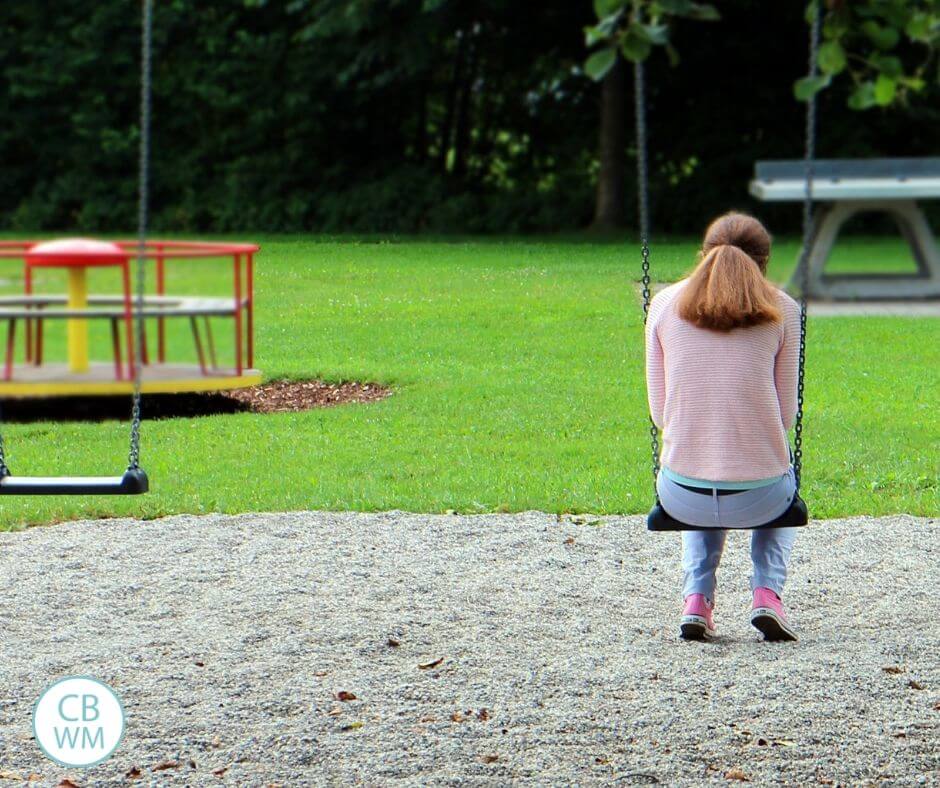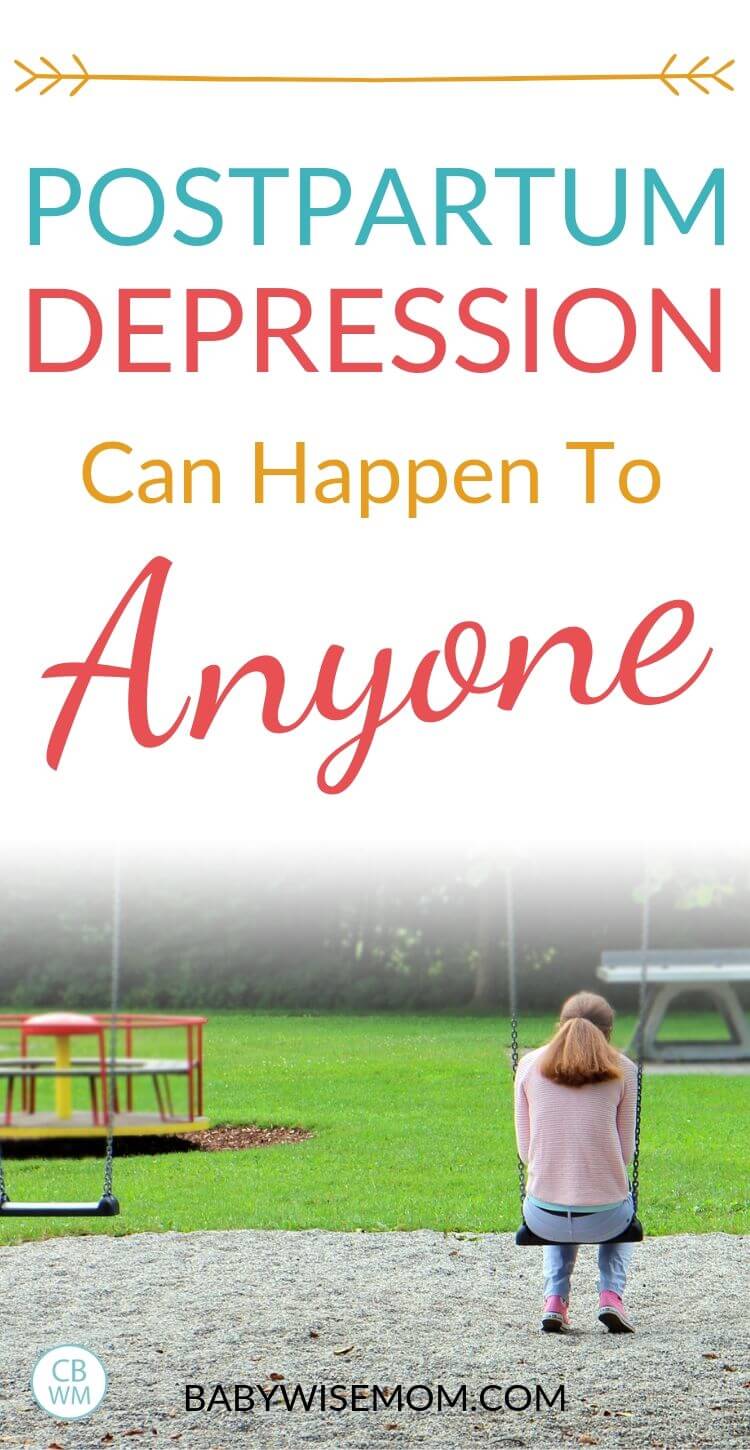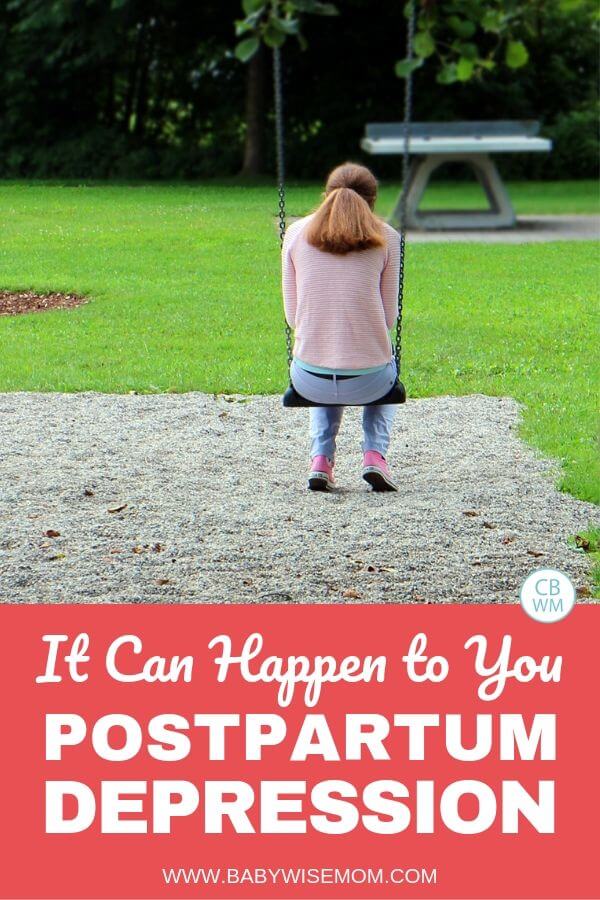Postpartum depression takes over your life and lies to you. Read all about one mom’s experience with postpartum depression with four babies.

by Tiffany A. Winkel Nutter
I remember the very first thought I had after I was officially diagnosed: “This doesn’t happen to ‘people like me’.”
4 children, 3 diagnoses, 2 rounds of therapy, and a Prozac in a pear tree later, I find myself almost laughing at that immature thought of exceptionality. I remember the thought so clearly because, in hindsight, it is actually hilarious. But, at the time, I felt it wholly and truly. “People like me” were supposed to have all their stuff together. “People like me” control the room with extroversion and humor. “People like me” have degrees and clean living rooms and children with perfectly braided hair. We read books and we teach voice lessons and we comfort sisters. “People like me” don’t get postpartum depression!
The first thing I learned about myself with my severely colicky first child was that I was an apparent control freak. We never slept and nursing fell apart within weeks. Months (and I mean MONTHS!) later, when we finally turned that exhausting corner, I found schedules and predictability, and I was able to enjoy my beautiful child. When my second was born, I tried to lasso that predictability as quickly as I could. It worked, at first. She slept through the night fairly early on and nursed like a champ. And then it hit me like a ton of bricks.
I think it was probably the third time I found myself inexplicably sobbing in a corner, my arms wrapped around my legs in the fetal position, my then 3-year-old shushing me and patting my back, that I realized, “Something is very wrong.” I approached a friend who was a professional counselor. I told her everything I’d been feeling, holding nothing back, and she told me without hesitation that I had postpartum depression.
“How do you know?” I asked her.
Post Contents
How To Know If You Have Postpartum Depression
For anyone who’s ever questioned if what they are feeling is the more common baby blues, or potentially something more extreme, like postpartum depression or anxiety, I give you the checklist she rattled off to me, which I have used after each of my subsequent children:
- inability to pull myself out of my sadness, anger, irritability, or anxiety
- excessive crying (mine, not the baby’s)
- constant state of guilt or feeling overwhelmed
- loss of appetite
- unable to sleep even when baby is
- withdrawing socially
- occasional paranoia
- anxiety or panic attacks

Postpartum Depression Treatment
She immediately referred me to her friend (she couldn’t see me herself, as that would have been a conflict of interest). The next morning, on a Monday, I called my OB and I was given a prescription for Prozac that afternoon.
I didn’t take it.
On Tuesday morning, I sat on the floor of my room, sandwiched in between my bed and where my then 8-week-old 2nd child was sleeping in her bassinet, a pill in the palm of my hand, and I silently cried for 45 minutes as I stared at what I then thought was a sure symbol of my worthlessness and weakness. But then I took it.
And nothing happened.
And I took another one the next day.
And nothing changed.
It took about a week for my permanent sadness to somewhat lift. And then I began therapy. My therapist told me, “Yes, you do indeed have postpartum depression.”
I was shocked at what I could only describe as relief swept over me. To truly feel like there was a legitimate reason for my having been a total jerk for weeks actually brought me relief! She also diagnosed me with PTSD from my first child’s extreme case of colic, which I found a little embarrassing. “You mean, I have what the warriors of our country have when they’ve seen atrocities and death because my baby cried a lot?” But that’s a story for another day….
I continued to take Prozac for the next four months. It helped. Sometimes I felt like it also stole my highs. But I was grateful to not be suffering from the lows anymore. I attended therapy once a week. To this day, I credit that for my healing more than anything else. Having someone to talk to who can validate your suffering and can be objective and guide you through it is invaluable. I stopped biting myself every time the baby cried for no reason. (Oh, did I not mention that? Yeah. That was weird).
Eating healthier and exercising and trying to get more sleep were all things I had hoped would also help, but they didn’t. And I had to remind the postpartum depression in my head that it was ok that those things didn’t work for me. I used to describe my PPD “like someone else was driving.” It was a presence in my head that I had to constantly battle to stop lying to me. It lies to us. It devalues us and guilts us and reminds us that there are people suffering unimaginable tragedies in the world and “so what?!” if we’re a little sad.
One thing my therapist said that, to this day, I often repeat to anyone who is berating their own suffering is that: “Pain is pain is pain.” It is absolutely ok to sit in that pain for a minute and feel mad or sad or discouraged. But then we get to work on figuring out how to alleviate it. Once I had sought help, I couldn’t understand why I had ever felt shame in the first place. It’s not as if I had asked for mental illness to be a part of my process.
Post-Partum Depression a Third and Fourth Time
I was diagnosed with PPD again after my third daughter. I didn’t like the side effects of Prozac, and so I tried to stick to a more holistic approach. That was not the right choice. My PPD took on more of an anxious face. Less tears, but more paranoia and even the occasional panic attack. The length of it also lasted a couple more months with each subsequent child. I battled it for nearly a year after my fourth child, my only son, was born. I was given a more mild antidepressant and I went back to therapy (the best decision I could make). My youngest is now 5 years old, and, fortunately for me, my battles with depression have only been postpartum; “seasonal” is how I often describe it, with gratitude.

Perspective for Moms with Post-Partum Depression
With hindsight as my clarifying goggles, there are a few things I would say to my past self that I now would like to share:
- First and foremost – DON’T LET IT SHAME YOU! It is far more common than many of us realize and it is not, in any way, a mark on who you are as a person or a mother. When I first typed that out, I wrote “Don’t be ashamed of it.” But then I changed it because it is the depression that is feeding you that shame. Don’t give it the satisfaction of winning.
- 2. FIND SOMEONE TO TALK TO – preferably a professional. But if that’s not an option, find anyone you can trust; preferably someone other than your partner. Sometimes the above-mentioned shame makes that difficult. But try to overcome that and air it out to someone. It makes a world of difference. Suffering alone exponentially increases the severity of the suffering, in my opinion.
- 3. FIND CONTROL WHERE YOU CAN, AND THEN LET THE REST GO – I had to really work through some issues I didn’t realize I had with the need to control things. Turning what seems like inevitable dead ends into choices can help you find a little bit of freedom. And then, when you’ve made a choice, anything else that you can’t do anything about needs to be set free.
- 4. DON’T BE AFRAID OF MEDICATION – as I mentioned before, this was very hard for me. I hated the idea that I would need to rely on something other than what I could do for myself. But brilliant people in the world have found amazing solutions to things that ail us. Don’t take that for granted if it can help! But be educated on potential side effects.
- SYMPTOMS DON’T HAVE TO BE TEXTBOOK TO BE REAL – everyone is different. So are our symptoms. Trust your intuition about yourself. Just because I had a checklist that worked for me doesn’t mean your version won’t be slightly tweaked or even completely different. Listen to your instincts.
- 6. IT’S OK TO USE IT AS AN EXCUSE – depression lies! It tells you that you are wrong in all the worst ways. There were times I had to say to myself, “You have depression. You aren’t trying to be horrible. But it is really hard for you not to be right now. So don’t hate yourself.” Coming up with mantras to repeat to yourself when you are in the thick of it is very helpful. For example, if my baby was inexplicably crying in their crib, I would say, “She is safer in there than out here with you” over and over until I could feel my body temperature drop back down and my pulse slow to normal.
- And lastly – IT CAN HAPPEN TO ANYONE – and it absolutely does. Never place your value as a person on your suffering. Our true value is how we come out of it. And you won’t be unscathed. But the greatest scar I gained in my battle with postpartum depression was a renewed sense of compassion. I see all new moms with less petty judgment than I embarrassingly did before. And I see those who suffer from mental illness as my comrades. If “people like me” can get it, so can you. And I absolutely love you for it.
